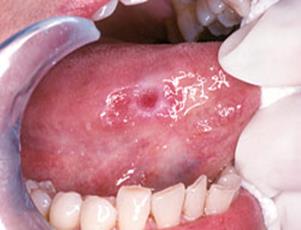 Oral cancer |
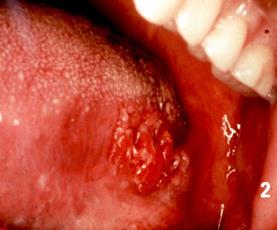 Oral cancer with Ulceration |
Introduction
Oral cancer and its treatment can cause a variety of dental problems and complications to patients. These problems diminish the patient’s quality of life and affect the cancer treatment.
Chemotherapy and radiotherapy used for cancer treatment can result in:
- Dry mouth.
- Mouth sores and ulcers.
- Tooth decay.
- Changes in taste
- Difficulty in swallowing.
- Difficulty in chewing.
- Gum infection.
- Pain in mouth and tongue.
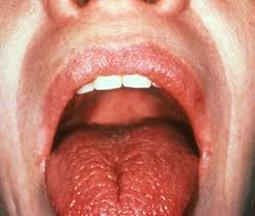 Mouth sores |
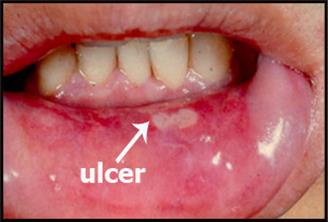 Ulcers |
Should you see a Dentist before undergoing chemotherapy or radiotherapy?
Yes. You need to see the dentist one month, before chemotherapy or radiotherapy commencing to give adequate time for pre-treatment oral care management. Seeing a dentist before cancer treatment can help prevent serious mouth problems.
What is Pre-treatment Oral Care?
It is a thorough oral evaluation by a dentist before cancer treatment begins. Pre-treatment oral care aims to achieve the following:
- Prompt treatment of existing infections or other problems. Treat or minimize oral infections that could lead to potentially serious systemic infections during the course of chemotherapy/radiation.
- Prevent or minimize complications resulting from compromised nutrition.
- Provides an opportunity for patient education on the importance of oral hygiene during cancer therapy.
- Dietary advice is given in liason with the dietition to optimise oral health and to ensure oral comfort during therapy.
What Will the Dentist Do?
The dentist will:
- Do a complete examination and prepare you for supportive care before, during and after your chemotherapy is completed.
- Take appropriate radiographs to detect possible sources of infection and pathology.
- Provide comprehensive dental treatment before commencing treatment for cancer.
- Show you how to take care of your mouth to prevent side effects.
- Advise and teach you to look in your mouth for sores or other changes when chemotherapy begins.
What should I do to prevent dental complications?
You should take good care of your dental health and follow your dentist’s advice to decrease your risks.
Oral Hygiene Practices Recommended For Oral Cancer Patients.
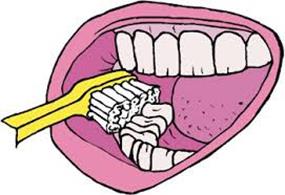
-
Keep your mouth moist.
- Drink water or sugar free drinks frequently.
- Suck ice chips to cool down and moisten your mouth.
- Chew sugarless gum to stimulate saliva production
- Use a saliva substitute with xylitol or oral moisturizers which contains carboxymethylcellulose or hydroxymethyl cellulose
- Avoid using mouthwashes with containing alcohol
- Clean your mouth, tongue, and gums.
- Brush your teeth, gums, and tongue with an extra-soft toothbrush after every meal and at bedtime. If brushing hurts, soften the bristles in warm water.
- Use fluoride toothpaste to reduce risks of dental decay.
- Floss your teeth gently every day. If your gums bleed and hurt, avoid the areas that are bleeding or sore, If there is presence of gum bleeding and swelling, use an alcohol-free chlorhexidine mouthwash or gel daily.
- Check that your denture or other dental prosthesis fits well.
- Dentures or prosthesis that does not fit well can injure the surface of your mouth. Talk to your dentist about replacement of dentures if they do not fit anymore.
- Do not wear your denture / prosthesis during treatment and while sleeping. Wear it only for meals.
- Dentures and prosthesis should be cleaned with a toothbrush after eating. Soak them in a glass with water mixed with sterilising tablet when not using.
-
Watch your diet
- Choose food that is soft and easy to chew or swallow
- Take small bites of food, chew slowly, and sip liquids with your meals. Sipping liquids with your meals will make eating and swallowing easier.
- Remember to stay away from carbonated and caffeinated drinks because it can irritate your mouth.
- Avoid sharp, crunchy foods, like chips that could scrape or cut your mouth and cause ulcers.
- Avoid foods that are hot, spicy, or high in acid, like citrus fruits and juices, which can irritate your mouth.
- Beware of sugary foods that could cause cavities.
- Eat healthy balanced diet and drink lots of water to hydrate yourself
-
Have your dentists contact number
- This is to ensure that you can call them when your mouth hurts and emergencies arise
- In case of pain, have some pain killer in stock and discuss with your dentists which one works well for you.
-
Avoid all tobacco products and alcohol
- If you are currently smoking, quit immediately. Avoid all tobacco products and alcohol because they irritate the lining of your mouth and throat.
- Regular check-up
- Come for regular check with your dentists at least once in every 6 weeks during cancer treatment so that professional cleaning and fluoride therapy can be carried out.
What should be observed while undergoing chemotherapy /radiation therapy?
During treatment it is important to adhere strictly to your mouth care plan as prescribed by your dentist.
- Monitor your oral health during cancer therapy to prevent, detect, and treat complications as soon as possible.
- When treatment is necessary, you should consult the oncologist before any dental procedure is undertaken.
- If your doctor prescribes both antibiotics and an antifungal rinse or lozenge (nystatin), do not take them together because this will reduce their efficacy. Separate their intake by at least one hour.
- To prevent discomfort when eating, you may apply Viscous Xylocaine (topical anesthetic) to your mouth, especially before meals. Viscous Xylocaine can be swished and spit out or it can be applied directly to a specific area with cotton tipped applicator.
- Pain medicine. such as Tylenol or stronger analgesics may help reduce oral pain if taken half an hour before meals.
- It is important to avoid aspirin or non-steroidal painkillers (Advil, Motrin) while on chemotherapy since they may increase bleeding tendencies.
- Drink at least eight glasses of water daily.
What should you do after chemotherapy or radiotherapy treatment is completed?
Chemotherapy and radiotherapy may cause damage to the oral tissues, salivary glands and your jaw bone. Dryness of the mouth is a common complication which may lead to multiple oral problems and sequelae. Prevention is key. Therefore ensure that you maintain good oral health and visit your dentist regularly.
Conclusion
- Visit your dentist before commencing cancer treatment.
- Take good care of your mouth during treatment.
- Talk regularly with your cancer doctor and dentist about any mouth problems you have.
- Continue with good dental care even after chemotherapy or radiotherapy is completed.
- If you are seeing a new dentist make sure you provide your health history and treatment received before starting any dental procedures so that appropriate actions to prevent complications can be taken.
References
- Keefe DM, Schubert MM, Elting LS, et al. Updated clinical practice guidelines for the prevention and treatment of mucositis. Cancer 2007 Mar 1; 109(5):820-31. Online at http://www.mascc.org/mc/page.do?sitePageId=87007 Exit Disclaimer (Accessed July 2009).
- Meurman JH, Grönroos L. Oral and dental health care of oral cancer patients: hyposalivation, caries and infections. 2010 Jun; 46(6):464-7.
- Schubert MM, Appelbaum FR, Peterson DE, Lloid ME. Oral complications. In: Blume KG, Forman SJ, eds.: Thomas’ Hematopoietic Cell Transplantation. 3rd ed. Malden, Mass: Blackwell Science Inc., 2004, pp 911-28.
- Shiboski CH, Hodgson TA, Ship JA, Schiødt M. Management of salivary hypofunction during and after radiotherapy. Oral Surg Oral Med Oral Pathol Oral Radiol Endod 2007; 103(suppl 1):S66.e1-S66.e19.
| Last Reviewed | : | 23 August 2019 |
| Writer | : | Dr. Lydia Mason ak Lionel |
| Accreditor | : | Dr. Savithri a/p Vengadasalam |
| Reviewer | : | Dr. Sharifah Tahirah bt. Syed Alwi Aljunid |







